Following two days of questioning by officers from France’s anti-corruption and financial crime police agency, OCLCIFF, former conservative president Nicolas Sarkozy was on Wednesday placed under formal investigation for “illicit funding of an electoral campaign”, “receiving and embezzling public funds” and “passive corruption” in relation to evidence suggesting his 2007 election campaign was partly funded by the regime of the late Libyan dictator Muammar Gaddafi.
To be “placed under investigation” in France requires that magistrates have found serious and/or concordant evidence that indicates a person has committed an offence, the gravest of two forms of indictments that under French law have now replaced what were previously “charges”.
It is unprecedented in France for a former president to face prosecution for having been sponsored by a foreign power. The alleged "embezzlement of public funds" was in reference to Libyan public funds.
According to sources close the investigation, during questioning Sarkozy, 63, strongly denied involvement in the alleged offences, in line with his prevous denials in public.
Sarkozy was released from the OCLCIFF headquarters in the Paris suburb of Nanterre, west of the capital, in the early evening on Wednesday. In an unusual move, the magistrates leading the police investigation, judges Serge Tournaire, Aude Buresi and Clément Herbo, had travelled to Nanterre to notify Sarkozy that they were placing him under investigation, rather than the usual custom that a suspect is brought before them. In what appeared to be a similarly clement decision, amid outrage expressed by many French conservatives who have claimed Sarkozy has been harshly treated, they lifted his placement in police custody late Tuesday to allow the former president to return to his Paris home before questioning continued early on Wednesday morning.
Sarkozy was also placed under “judicial control”, which is a restrictive measure that can be applied when it is considered that there is a risk that the person in question may evade justice, place pressure on a witness or pose a threat to the victim of a crime, or re-commit an offence. The exact terms of the judicial control were not detailed on Wednesday evening.
Also summoned for questioning this week was Sarkozy’s longstanding political ally and friend Brice Hortefeux, an MEP who served twice as a minister during Sarkozy’s 2007-2012 presidency. Hortefeux, who, as detailed below, was a member of Sarkozy’s close political team that was directly involved in the dealings with the Gaddafi regime, was released at around 11.30 pm on Tuesday after appearing before police as a “free suspect”, which meant he was not placed in custody. He made no comment to waiting journalists, but later published a statement on Twitter in which he said the answers he gave police “should allow for the closure of a succession of errors and lies”.
The former president and members of his close entourage are suspected of having negotiated the Libyan funding of his 2007 election campaign in 2006, when Sarkozy was interior minister. In April 2012, Mediapart, which first revealed evidence of the secret funding in 2011, published a Libyan government document – since authenticated by the current judicial investigation – that approved the payment of up to 50 million euros to Sarkozy’s campaign.
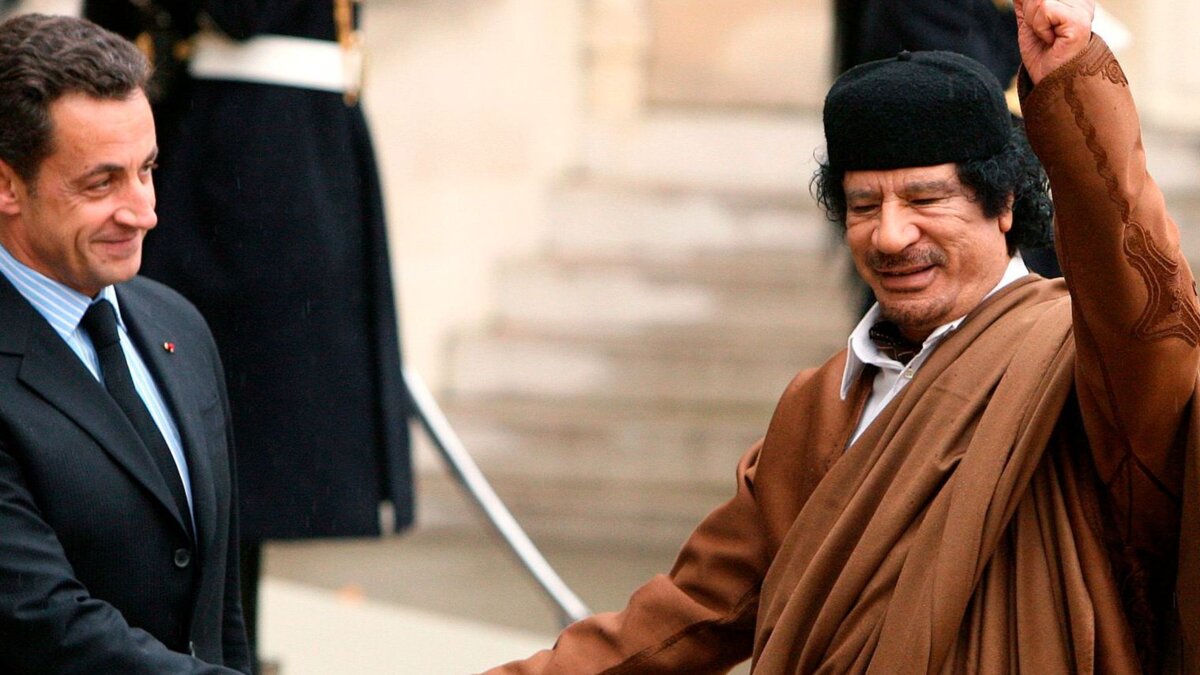
Enlargement : Illustration 1

Witness statements, including the account of the intermediary used by Sarkozy and his entourage in their dealings with Gaddafi, have since detailed how the funding was delivered in cash instalments.
Sarkozy has consistently denied he received funds from Tripoli.
The judicial investigation, headed by three magistrates and opened in 2013 following Mediapart’s revelations, centres upon “suspected active and passive corruption, influence peddling, misuse of public funds, misuse of corporate funds, forgery and use of forgery, money laundering the proceeds of tax fraud,” by persons unknown.
Sarkozy is already under investigation for “corruption”, “influence peddling” and receiving information gained through “violation of professional secrecy” in a separate case in which he allegedly sought to corrupt a ranking magistrate in order to receive confidential information about two investigations in which he was cited. He is also due to stand trial in a case centred on the hidden spending in his failed 2012 re-election bid, when a system of false billing was used during his campaign to secretly overrun the ceiling on spending fixed by law.
But the evidence that has emerged in the Libyan funding case threatens to result in one of the biggest political financing scandals in post-war France.
At its origins was the open rivalry for leadership of the French conservative party between then president Jacques Chirac and his minister Nicolas Sarkozy. With the approach of the 2007 presidential elections, Sarkozy began positioning himself early on to become his UMP party’s candidate to succeed Chirac, and to prepare his campaign.
In 2005, Chirac stamped out a contract negotiated by Sarkozy, then interior minister, for the sale of weapons to Saudi Arabia on suspicion that it was also destined to provide secret funding for Sarkozy’s campaign. The deal had been negotiated with the services of a Paris-based Lebanese businessman called Ziad Takieddine, who acted as an intermediary. Takieddine was subsequently to play a key role in Sarkozy’s relations with Gaddafi.
They began with a visit to Tripoli in September 2005 by Claude Guéant, Sarkozy’s chief-of-staff at the interior ministry (who would later be made interior minister under Sarkozy’s presidency), which was organised by Takieddine. Police later found notes recorded on the businessman’s computer in which he insisted that the trip to meet members of the regime, which he described as being of “extreme importance”, must remain secret. In those confidential notes, he also writes that during his sojourn in Libya, Guéant will be in a position “to refer to the other important subject, in a most direct manner”. The “other” subject was not detailed.
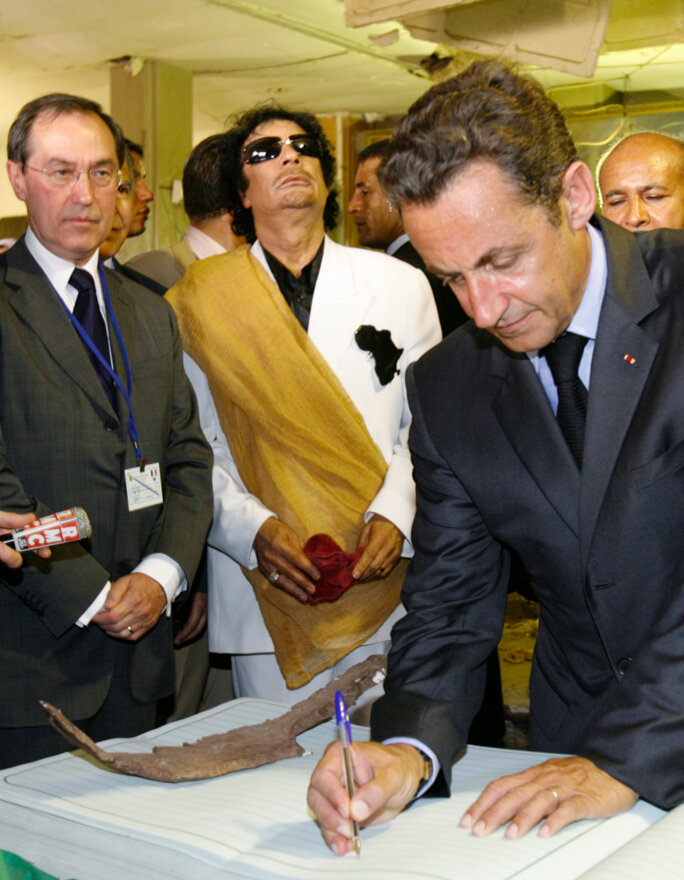
Enlargement : Illustration 2

Following Guéant’s trip, Sarkozy travelled to Libya to meet with Gaddafi on October 6th 2005. The meeting in Tripoli that day took place first in the company of aides of the two men and then with only their respective translators present. France’s ambassador to Libya at the time, Jean-Luc Sibiude, later commented to Sarkozy’s translator that he found that the meeting of two men alone was particularly long. The interpreter was questioned by the current investigation in July 2016, when she refused to breach her sworn professional secrecy. Asked directly whether funding of Sarkozy’s campaign was discussed, she said in her statement: “I will not tell you whether there was a request or not […] I have nothing to say about the eventual contents of the conversation […] if I begin to talk it won’t ever stop”.
In December 2005, Brice Hortefeux, a longtime friend and ally of Sarkozy’s, travelled to Libya. At the time, Hortefeux was a junior minister for local authorities, and in the opinion of ambassador Sibiude, his trip, which was an official one in his capacity as junior minister, made “little sense”. Hortefeux was accompanied by Takieddine, who presented him to Abdullah Senussi, Gaddafi’s internal security chief, who had been sentenced 'in absentia' in France in 1999 for organising the bombing of a French airliner over Niger in 1989 that left 170 people dead.
A notebook found after Libyan PM's death
Hortefeux, who was taken in for questioning on Tuesday along with Sarkozy, has admitted meeting with Senussi but said he can no longer recall what was discussed. However, Takieddine, in a video interview with Mediapart in November 2016 (see below) and in statements to the investigation, said he later travelled to Libya on Senussi’s request to pick up cash sums to take to France in suitcases. Takieddine said that between November 2006 and January 2007, he twice handed over cash sums from Tripoli to Claude Guéant, and once to Sarkozy in person, and on each occasion the delivery was made at the French interior ministry. Questioned by the International Criminal Court in September 2012, one year after the toppling of the Gaddafi regime, Senussi gave testimony that confirmed Takieddine’s account, saying he personally supervised the payment “of five million euros” to be used to fund Sarkozy’s 2007 election campaign.
Another who confirmed the payments was Shukri Ghanem, prime minister of Libya from 2003 to 2006 and then oil minister until 2011. Close to Gaddafi's son Saif al-Islam, whom he took under his wing after the latter's university studies, Ghanem was a key regime figure in charge of its principal resource – oil – as well as its secrets. He was one of the leading figures in Libya who defected from Gaddafi's regime as France and Britain launched their NATO-led intervention in the country in 2011.
Ghanem regularly took notes of events and meetings during his time in Gaddafi’s government, apparently with a view to one day publishing his memoirs. On April 29th, 2007, exactly a week after the first round of the presidential election in France, Ghanem wrote an account in Arabic in his notebook of a meeting that he had held with another prominent member of the regime, Bashir Saleh, head of Gaddafi’s 40-billion dollar Libyan African Portfolio (LAP) sovereign wealth investment fund and his former chief of staff. Also present at the meeting was the then-prime minister Baghdadi Ali Mahmoudi. During the meeting Saleh said that he had transferred 1.5 million euros to Nicolas Sarkozy, wrote Ghanem.
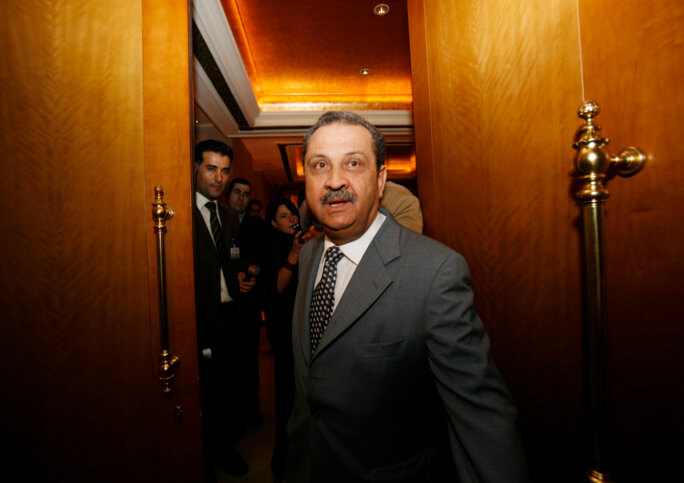
Enlargement : Illustration 4

The names of other regime figures were also recorded in the notebook, as well as additional payment sums: 3 million euros sent by Saif al-Islam and 2 million euros by Libya's spy chief Abdullah Senussi, who was also Gaddafi's brother-in-law. Thus according to Shukri Ghanem's notes, a total of 6.5 million euros was sent to Sarkozy's team, at the height of the French presidential election.
The notebook was found after his death: on April 29th, 2012, exactly five years after he recorded the meeting with Saleh, Ghanem's body was found floating in the River Danube in Vienna, where he had taken refuge after fleeing Libya. At first Austrian police considered the theory that he had been assassinated, but later concluded that Ghanem had drowned accidentally following a heart attack.
Ghanem’s body was found the day after Mediapart published an official document drawn up by Moussa Koussa in December 2006 which gave the Gaddafi regime’s approval to “support the electoral campaign” of Nicolas Sarkozy for the 2007 presidential elections, and up to the “sum of fifty million euros”. Sarkozy launched a suit against Mediapart alleging the document was a forgery, but it has subsequently been confirmed as genuine by several expert witnesses consulted by the investigation.
Former Libyan officials confirm the funding
During the current judicial investigation, it was discovered that Claude Guéant, who had the nickname of “the cardinal”, had rented a vast safe from the BNP bank at an agency near the central Paris opera house in 2007. The rental of the safe, described as tall enough for a person to walk inside it head high, was only for the period of the 2007 presidential election campaign. The bank records showed that Guéant visited the safe in person on seven occasions between March 23rd and July 19th. When the anti-corruption police asked him what purpose the safe served, Guéant replied that it was to stock campaign speeches by Nicolas Sarkozy.
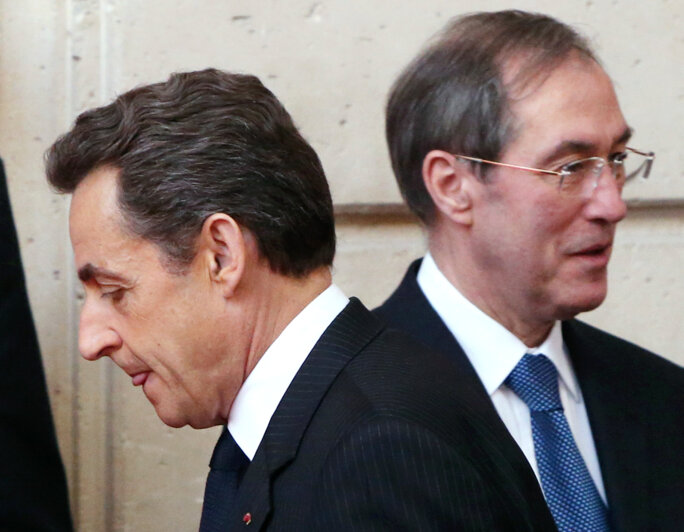
Enlargement : Illustration 5

Statements given to the investigation by several former members of the campaign team have described receiving part of their remunerations in cash payments, and under questioning, the campaign treasurer, Éric Woerth, admitted the significant amount of cash payments made during the campaign, but claimed that these were from donations sent by supporters through the post – a claim refuted by the person who was then in charge of the postal services for the UMP party.
In September 2017, one of the investigating officers of the OCLCIFF anti-corruption police wrote up their first summary report on the state of their enquiries, in which he spoke of the “large degree of the circulation of cash on the sidelines of the campaign”, the “materialisation of the suspicions about Libyan financing”, and the “absence of sincerity in the campaign accounts”.
Several Libyan former members of Gaddafi’s regime have added their testimony to the funding scam. As already mentioned, these include former internal security chief Abdullah Senussi, who is currently held in a Libyan prison. Gaddafi’s foreign intelligence chief at the time, Moussa Koussa, who signature is on the funding agreement document published by Mediapart, was questioned by the French investigation at his home in exile in Qatar. He described the subject of Libyan funding of Sarkozy’s campaign as “dangerous”, but has refused to either confirmed or deny that it happened.
Bashir Saleh, Gaddafi’s chief of staff and head of the Libyan African Portfolio (LAP) sovereign wealth investment fund, at first found secret exile in France after the toppling of the Gaddafi regime. He was wanted for arrest by the fledgling post-Gaddafi authorities in Libya, and the warrant against him was relayed by Interpol. However, as reported by Mediapart, he was smuggled out of France before his presence became known to Interpol, settling in South Africa where he continues to live. Despite his long silence on the subject of the funding and the help he received from those close to Sarkozy, both in fleeing Libya and later France, he appeared to confirm its existence in an interview last September with French daily Le Monde. Last month he was shot and wounded in northern Johannesburg in what South African police described as an attempted robbery.
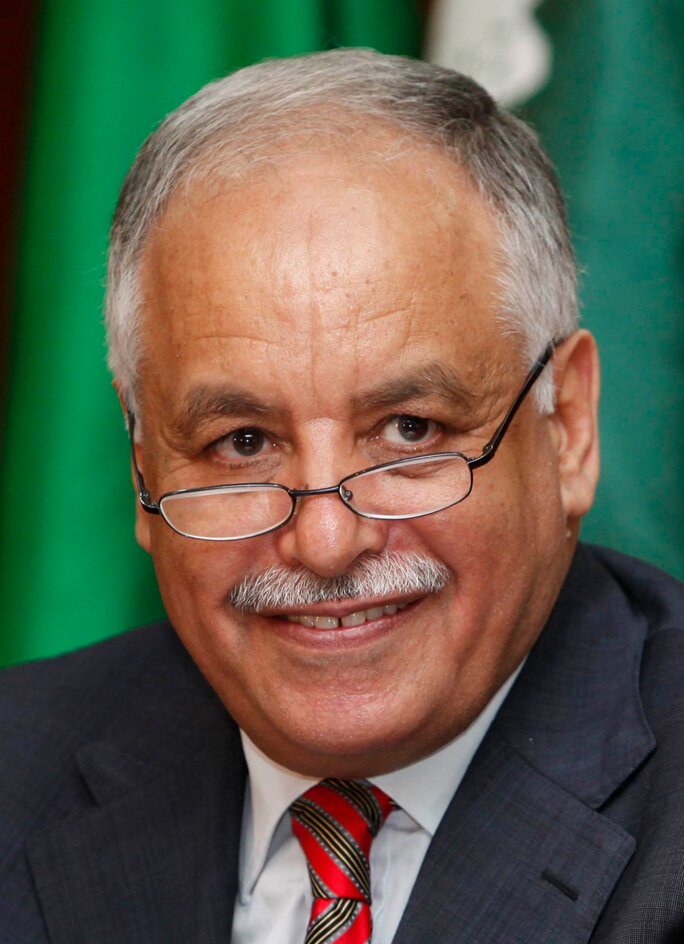
Enlargement : Illustration 6

Meanwhile, a former prime minister under the Gaddafi regime from 2006 to 2011, Baghdadi Ali Mahmoudi, has said he himself supervised the funds handed to Sarkozy. Mahmoudi, who is currently in prison, like Senussi, in Libya, had initially fled his country for neighbouring Tunisia in August 2011 as the Gaddafi regime was crushed. In October 2011, he appeared before the Tunis appeal court in a bid to fight the request for his extradition that had been filed by the new Libyan authorities. During the hearing, which lasted close to three hours, he was questioned about what his lawyer called “the political aspect of the case”. That was when he told the court: “Yes, as prime minister I myself supervised the case of the financing of Sarkozy’s campaign from Tripoli. Funds were transferred to Switzerland and Nicolas Sarkozy was grateful for this Libyan aide, and never stopped saying so to certain intermediaries.”
Another Gaddafi regime figure to confirm the funding was Mohamed Ismail, chief of staff to Gaddafi’s son Saif al-Islam Gaddafi. In May 2012 he sent an email to Mediapart, which has since been authenticated by the French police, in which he described one banking route through which the Libyan funding for Sarkozy was sent. “Concerning the financing of the campaign, part of the funds transited through a commercial bank in Beirut and from there it went on to a bank account in Germany connected to Ziad [Takieddine],” he wrote.
French police have found trace on a computer used by Takieddine of a bank transfer on November 20th 2006 of 2 million euros which closely matches Ismail's account. The sum was sent by the Libyan Arab Foreign Bank, an establishment under the control of the Gaddafi regime, to an offshore company belonging to Takieddine called Rossfield Ltd. The money, which appears to have no contract to justify it, passed through the Intercontinental Bank of Lebanon and a bank in Germany.
-------------------------
- This is an abridged version of a report by Mediapart in French, which can be found here.
English version by Graham Tearse


